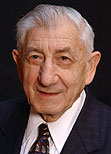June 3, 2009
Morris Rosen discusses his evacuation and forced march on foot in February 1945 from a subcamp of the Gross Rosen concentration camp in Poland to the Theresienstadt camp in Czechoslovakia. In an effort to cover up their crimes and prevent prisoners from falling into enemy hands, Nazi officials evacuated prisoners from camp to camp in what became known as "death marches."
LISTEN
Esta página también está disponible en español.
TRANSCRIPT
MORRIS ROSEN:
I was angry, there were some women there from the house, they looked at it and they were smiling. I said, "My God, where’s God? That’s the punishment we get for being Jewish."
NARRATOR:
Over 60 years after the Holocaust, hatred, antisemitism and genocide still threaten our world. The life stories of Holocaust survivors transcend the decades and remind us of the constant need to be vigilant citizens and to stop injustice, prejudice and hatred wherever and whenever they occur.
This podcast series presents excerpts of interviews with Holocaust survivors from the United States Holocaust Memorial Museum’s public program First Person: Conversations with Holocaust Survivors.
In today’s episode Morris Rosen talks with guest host Suzy Snyder about his death march from a sub camp of the Gross Rosen concentration camp to the Theresienstadt camp in February 1945.
SUSAN SNYDER:
I want you to talk about-- because we’re running out of time-- and I want you to talk about your experiences in going to Buchenwald and then to Theresienstadt.
MORRIS ROSEN:
Well, what happened at that time it was miserable, the whole thing. I had it better I went over to block six but then it was happen February the 5th, 1945. We don’t go to work. We heard--you know, people work with the other prisoners-- Frenchmen or this or that the Russian army already entered Germany, this or this. We don’t go to work. Everybody takes their blankets. Everybody got a loaf bread with a piece margarine with marmalade and we start walking for eight hours straight because actually we heard already tanks running down rolling and the head of the SS, we had to walk so fast whoever stood behind got a bullet in the head right away.
Then we came to a little city, we saw the German army retreating. So one officer came to the Lageraeltesten and say, “What do you want for them? Don’t you see the war’s almost over. Leave them go?” Mm-mm, he had other instructions where to take us. He took us into the woods again for another eight hours walking. I could hardly walk; my feet got swollen. And whoever stood behind got a bullet. They shot about 30 guys at that night and it was miserable.
Then finally we rested up, so you went in to a barn to sleep on hay and what happened, the farmer prepared there food for the horses and for the pigs. We ate up everything that the farmer didn’t have anything left for the horses or the pigs there, what he prepared. So he complained to the SS men. For punishment, no more sleeping in the barn. We slept on the outside in the bitter cold on the snow. We huddled one between the other. Okay, about two weeks later we--
SUSAN SNYDER:
Okay. Sorry, I have to interrupt you again. You’re walking all this time?
MORRIS ROSEN:
Yeah.
SUSAN SNYDER:
So two weeks later-- so from the barn, two weeks later, you’re walking every day?
MORRIS ROSEN:
Every day till we came to Dresden.
SUSAN SNYDER:
Tell me about where you’re walking. Are people looking at you while you’re walking?
MORRIS ROSEN:
We didn’t know-- no--
SUSAN SNYDER:
Were there civilians seeing you?
MORRIS ROSEN:
No, not civilians. Some they smile, they laugh, anything.
SUSAN SNYDER:
Did anyone try to help you?
MORRIS ROSEN:
No, nothing. Then we pass by Dresden, the Elbe River. He says, “Aus hier.” Everybody gets undressed and you full with lice and wash your clothing in the Elbe River. It’s wintertime. We have to scrub our—what we walked in. It was so bitter cold and we jumped around. I have some friends. We rubbed our backs back to back. Then, “Aus hier.” We have to go get dressed. I want to put on my pants. I lost half of my pants. It was frozen like a ball. So the right side I have to unglue inch by inch.
At that time, within three days, we lost about 400 men at that time from the cold weather. Who can stand that cold with no food, with no nothing? And what--I was angry, there was some women there from the house, they looked at it and they were smiling. I said, “My God, where’s God? That’s the punishment we get for being Jewish.”
NARRATOR:
You have been listening to First Person: Conversations with Holocaust Survivors, a podcast series of the United States Holocaust Memorial Museum. Every Wednesday at 1 p.m. from March through August, Holocaust survivors share their stories during First Person programs held at the Museum in Washington, DC. We would appreciate your feedback on this series. [Please take our First Person podcast survey (external link) and let us know what you think.]
[On] our website you can also learn more about the Museum’s survivors, listen to the complete recordings of their conversations, and listen to the Museum podcasts Voices on Antisemitism and Voices on Genocide Prevention.


